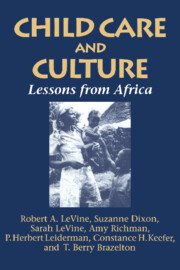Book contents
- Frontmatter
- Contents
- List of tables and figures
- Foreword
- Acknowledgments
- Introduction
- Part I African infancy: Frameworks for understanding
- Part II Parenthood among the Gusii of Kenya
- Part III Infant care and development in a Gusii community
- 6 Infant care: Cultural norms and interpersonal environment
- 7 Survival and health: Priorities for early development
- 8 Communication and social learning during infancy
- 9 Variations in infant interaction: Illustrative cases
- Part IV Interpretations
- Appendix A Fieldwork procedures: Initial phases and planning
- Appendix B Coding categories for spot observations
- Appendix C Blankhart Nutrition Questionnaire
- Appendix D Temperament Assessment Method
- Appendix E Coding categories for narrative observations
- Appendix F Coding categories for face-to-face interaction
- Appendix G Coding categories for maternal teaching task
- Appendix H Supplementary tables
- Notes
- References
- Index
- Plate section
9 - Variations in infant interaction: Illustrative cases
from Part III - Infant care and development in a Gusii community
Published online by Cambridge University Press: 11 May 2010
- Frontmatter
- Contents
- List of tables and figures
- Foreword
- Acknowledgments
- Introduction
- Part I African infancy: Frameworks for understanding
- Part II Parenthood among the Gusii of Kenya
- Part III Infant care and development in a Gusii community
- 6 Infant care: Cultural norms and interpersonal environment
- 7 Survival and health: Priorities for early development
- 8 Communication and social learning during infancy
- 9 Variations in infant interaction: Illustrative cases
- Part IV Interpretations
- Appendix A Fieldwork procedures: Initial phases and planning
- Appendix B Coding categories for spot observations
- Appendix C Blankhart Nutrition Questionnaire
- Appendix D Temperament Assessment Method
- Appendix E Coding categories for narrative observations
- Appendix F Coding categories for face-to-face interaction
- Appendix G Coding categories for maternal teaching task
- Appendix H Supplementary tables
- Notes
- References
- Index
- Plate section
Summary
Gusii parents share a cultural model of child care, but their central tendencies in implementing it, as described and examined comparatively in the previous chapters, do not convey adequately the diversity of environmental conditions in which Gusii infants are raised. We found as much variation in personality, family background, and current situation among the 28 sets of parents in our longitudinal sample as one would find in any population, and more socioeconomic differentials than one would find in rural African communities less affected by recent change. All of this translated into varying environments for their babies, who also varied in their temperamental responsiveness and in their birth order among the children of one mother. Although we could not investigate these individual variations systematically in our small sample, we can illustrate them with cases of particular conditions that run counter to the statistical norm or represent extremes within it, thus showing the imperfect realization of a cultural model in actual practice.
To exemplify this diversity, we chose parents differing in age and infants differing in birth order. Older parents tended to be wealthier, less educated, and more experienced in child care – wealthier because men in their 40s and 50s during the mid-1970s had inherited land at a time when it was more abundant and had had more time to accumulate possessions, but less educated because they belonged to a cohort in which school attendance was relatively rare.
- Type
- Chapter
- Information
- Child Care and CultureLessons from Africa, pp. 224 - 244Publisher: Cambridge University PressPrint publication year: 1994



